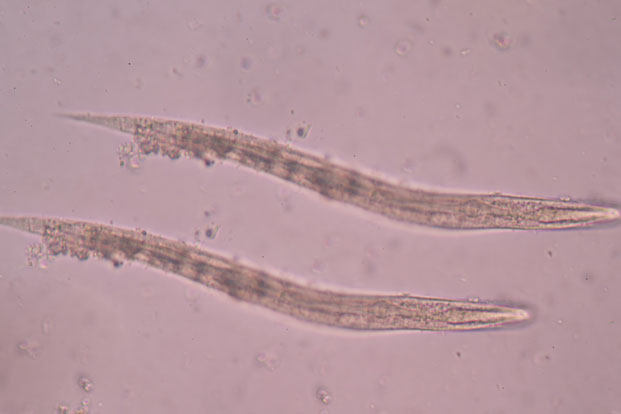A parasite is an organism that lives inside another body (the host) and typically harms the host by draining blood, minerals or other vital keys to good health.
In humans, parasite infections are more common in developing areas than in urban settings but can be carried to cities by immigrants or travelers returning home. Asia, Africa and Latin American travelers in particular may be sources for them.
Ways to Acquire a Parasite
There are several types of parasites. They include tapeworms, whipworms, dog tapeworms, roundworms and Toxoplasma gondii, among others.
While there are several ways a parasite can enter the body, most are ingested through the mouth or skin, usually through food. That’s why travelers to foreign countries are advised never to eat raw foods or drink water without filtering or boiling. The standard advice is to cook, peel or boil anything before ingesting.
But not every parasitic infection is brought from other areas. Some infections occur because of poor sanitation practices at institutions or care centers, while still others may be acquired through sexual practices.
Children and the elderly are most likely to be at risk of infection and having a weakened immune system caused by HIV/AIDS can also make someone particularly vulnerable. How long the patient is ill and how seriously the illness progresses is a matter of individual health and the specific parasite that caused the illness. A pregnant woman who acquires a parasite will need to be treated and monitored closely so as not to harm the fetus.
One of the hazards of a parasitic infection is that it may not be easily identifiable to a medical professional who hasn’t dealt with it. The patient may not even know he or she has the infection, making it difficult for a doctor to ascertain that the symptoms match up with a particular infection.
It is important to mention recent foreign traveled when presenting with symptoms so that the doctor may investigate the cause and effects of the illness further. Drugs can defeat most parasites, but identifying the problem a long way toward solving it quickly.
Types of Parasitic Infections
There are two main types of intestinal parasites, helminths and protozoa. Helminths are many-celled worms, and roundworms, pinworms, or tapeworms are the most commonly seen in the United States. Adult helminths can’t multiply in the human body. Protozoa are one-celled creatures and can multiply once inside the host, which can create serious infections. Giardia and Cryptosporidium are the two most common protozoa, usually acquired when an individual comes into contact with infected feces from food, water or soil. That’s why you see those restroom signs urging workers to wash their hands in restaurants.
Symptoms of Parasite Infections
Parasites may live in their hosts for years without manifesting any symptoms, but when they arrive, it’s usually with a bang. Symptoms include diarrhea, abdominal pain, gas, bloating, nausea, vomiting, a rash or itching in the rectum or vulva, dysentery, tiredness, stomach pain or tenderness, weight loss, or the most obvious sign, passing a worm in the stool.
Testing and Treatment for Parasitic Infections
During a physical exam, a doctor usually will ask about recent travel or other contact that may have put the patient at risk of acquiring a parasite. Once doctors suspect that a patient is suffering from an intestinal parasite, they will follow up with specific tests. These include fecal testing, which is used to examine the stool for the presence of helminths and protozoa; a scotch tape test, in which a piece of tape is touched to the anus several times, then examined in a laboratory for microscopic eggs; or X-rays with barium, which traces the digestive system and allows the doctors to spot any potential trouble zones.
Once a specific parasite is discovered, drug therapy is usually the course of action. One dose of certain antibiotics may be enough to kill parasites, but some may require medication over the course of several weeks. You must follow the prescribed dose exactly, even when feeling better, to eradicate the parasite completely.
In some cases, doctors may try alternative or complementary therapies in conjunction with traditional medication. It is prudent to discuss any potential ingestion of alternative medicines, even common herbs, with the doctor so as not to counteract any traditional medications or decrease their efficacy.
Some nutritional tactics to rid parasites include avoiding simple carbohydrates and sugars. These include many refined foods, juices, fruits, dairy and all sugars but honey. This will starve the parasite of needed energy.
Patients may also be told to eat more pumpkin seeds, raw garlic, beets, pomegranates, and carrots, which have traditionally killed some parasites. This is more than old wives’ tales or tribal mythology – one research study concluded that a mixture of papaya seeds and honey cleared the stools of 23 out of 30 subjects.
Along with adjusting the diet, it’s advisable to drink a lot of water to flush the system and eat more fiber, which can help move worms out.
Probiotics, which are helpful gut bacteria, may be ingested to help keep the system well-flushed, but consult a doctor before taking them. Common probiotics recommended include Lactobacillus acidophilus, Lactobacilus plantarum, Saccharomyces boulardii and bifidobacteria, but none are recommended if the patient has immune system issues.
Digestive enzymes may also play a role in restoring the intestinal system to prime health. The papain enzyme comes from the papaya plant and may help kill worms if taken shortly after meals but may increase bleeding in those people who have clotting issues, particularly those who are already on blood-thinning medications.
Any treatment will require follow-up testing to ensure that the parasites are completely gone. The tests will usually require a repeat of stool samples and blood work.
Parasites can cause major illnesses, but treatments usually restore patients back to normal health in short order if treatments are followed. It is important to follow treatment instructions closely, though. If the parasite returns, it can cause more serious health problems.

Leave a Reply